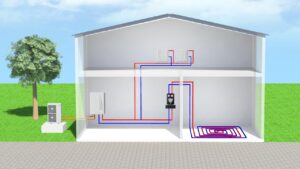In FY 2021, the heat pump market reached US $65.4 billion and is expected to register a CAGR of 8.0% in 2022, ending at US $71.29 billion. Moreover, the growth is expected to accelerate at a whopping CAGR of 9.0% during the assessment period 2022-2032, reaching US$ 168.76 billion.
Heat pump is a mechanical-compression cycle refrigeration system that can be reversed to either heat or cool desired space. Therefore, it is massively used in space heating and cooling applications. It is composed of two main components, which include an indoor air handler and an outdoor unit that is quite similar to the central air-conditioner but referred to as a heat pump.
Contribution of Heat Pump Technology to Reduce Carbon Footprint
Heat pumps are gaining immense popularity in recent years as an efficient way to reduce carbon footprint and increase energy efficiency. Heat pumps offer an effective way to heat and cool a building by utilizing the natural heat stored in the ground, air and water, and transferring it indoors. Heat pumps are incredibly efficient and can save up to 50-70% of energy compared to other heating systems such as electric resistance heating. Heat pumps are an environmentally friendly solution as they are powered by electricity, which is a renewable energy source, and therefore does not emit any harmful greenhouse gases.

Furthermore, they can also be used to preheat hot water, as well as provide cooling during hot summer days. Heat pumps are also cost effective and can reduce energy costs by up to 25%. They are also much quieter than traditional heating and cooling systems. Heat pumps also require little maintenance, and can last up to 20 years or more with proper maintenance. Heat pumps provide a great way to reduce energy bills and carbon footprint, while providing a comfortable and clean environment.
Key Challenges encountered by the Heat Pump Industry
- The heat pump industry is a rapidly growing sector of energy production, but there are several key challenges that the industry must face in order to remain competitive and successful. The primary challenge is the cost of production, as the technology behind heat pumps is complex and expensive.
- Additionally, the installation and maintenance of heat pumps is labor-intensive and often requires specialized expertise. Another challenge is the availability of suitable sites for installation, as many potential sites may be located in remote areas or may not have the necessary infrastructure in place for a successful installation. Additionally, the environmental impact of heat pumps must be taken into account, as the technology often requires a significant amount of energy and resources.
- Finally, the regulatory environment surrounding heat pumps can be complex and difficult to navigate, often requiring companies to comply with a variety of local, state, and federal regulations. These challenges are significant and can be difficult to overcome, but understanding and addressing these issues can make the heat pump industry more successful and sustainable.